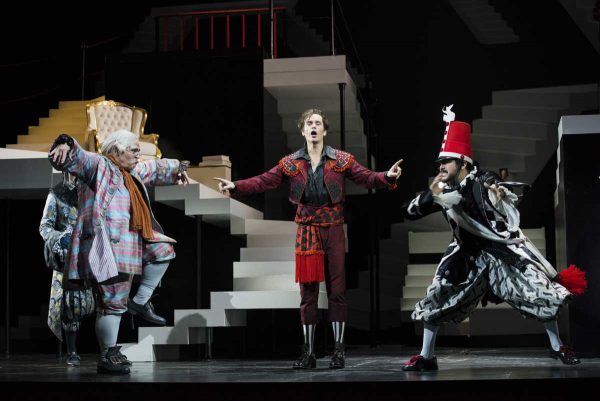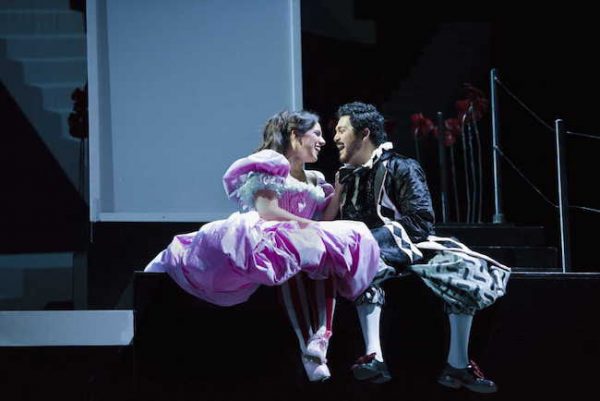Opera Review: BLO’s “The Barber of Seville” — An Exhilarating Triumph
Every performance of opera should leave an audience so exhilarated.
The Barber of Seville Music by Gioacchino Rossini. Libretto by Cesare Sterbini. Music Director David Angus. Staged by the Boston Lyric Opera at the Emerson Cutler Majestic Theatre, Boston, MA, through October 21.

(l.r.) Steven Condy as Bartolo, Matthew Worth as Figaro, and Jesus Garcia as Almaviva in Boston Lyric Opera’s production of “The Barber of Saville.” Photo: Liza Voll.
By Helen Epstein
To cut to the chase, this effervescent, sumptuous production of one of opera’s perennial bestsellers is a triumph on every count and, perhaps more important, enormous fun. Gioacchino Rossini’s gag-filled comic opera was composed in 1816 for carnival season and is based on one of three plays by Beaumarchais about the enterprising barber and supremely self-confident fixer Figaro. A few of the tunes have been popularized by cartoons like Bugs Bunny; other excerpts are a staple of classical radio. The characters in The Barber of Seville are drawn from traditional figures that date back to the Romans. So this is a lively, highly accessible, “relatable” opera – the challenge is to give it contemporary life.
The Boston Lyric Opera is fortunate in having cultivated an artistic partnership between Music Director David Angus and Stage Director Rosetta Cucchi who have directed five operas together. Born in Rossini’s hometown of Pesaro, Cucchi worked as a pianist at the Rossini opera festival and, in her program note, writes that she has played piano for Barber literally thousands of times. This is her second time directing it, and she has done so with a sure hand, coordinating a team of designers who are all on the same wacky, whimsically-oriented page. Their vision is so unified that I found myself thinking, strangely, of the term Gesammtkunstwerk, more frequently associated with heavy serious Wagnerian opera, to underscore opera’s essence as a total work of art relying equally on spectacle, music, drama, movement, and words.
Let me begin with the spectacle: an Escher-like black, gray and white set by Julia Noulin-Merat. It is a bold and pleasing mix of geometric patterns, stairs and ladders against and on which the cast, costumed in vivid shades of pink, red, maroon, and florid prints scurries, struts and poses, sometimes behind a screen that offers up a series of stylized silhouettes. The chorus members wear high black and white headdresses with scissors drawn across the sides and striped tights beneath their harem-like pantaloons, evoking the commedia dell’arte from which their prototypes are drawn. They look splendid, exotic, unctuous, and ridiculous.
The principals are all costumed in more elaborate, fanciful, can’t-take-your-eyes-off them clothing by designer Gianluca Falaschi. Bartolo and Bertha, the old bourgeois doctor and his housekeeper, are turned out in superbly silly costumes . Rosina is a study in pink to Figaro’s red. The ensemble is beautifully lit by D.M. Wood whose work I particularly admired when she introduced the sinister music teacher Don Basilio (a Frankenstein-like figure)’s entry by bathing his path in a sickening green light.
The singers not only sing, but are persuasive actors who romp nimbly up and down the set of this luscious production. Their voices vary in timbre and power but they coalesce into a pleasing ensemble and each manages to perform demanding stage business while performing Rossini’s patter, ornamentation, crescendi and coloratura passages with ease and panache.
Tenor Jesus Garcia is a strong Count Almaviva, the aristocrat who falls for Rosina and disguises himself as a commoner named Lindoro in order to make sure she likes him for himself alone, not for his rank or riches. Somewhat shorter than I expected, he made up for height with assurance and performed his three guises of Count, Lindoro, and the bogus music teacher Don Alonso with brio and great comic flair.

(l.r.) Daniela Mack as Rosina and Jesus Garcia as Count Almaviva in Boston Lyric Opera’s production of “The Barber of Saville.” Photo: Liza Voll.
Baritone Matthew Worth is, by contrast, far taller and lankier than any Figaro I’ve seen. He channels the mythological figure of the trickster in his character of Figaro, along with all the empathic and helpful qualities of a contemporary hairdresser. Worth has a light but very beautiful voice and a wonderfully mischievous presence. I’d like to see him as Papageno.
Mezzo Daniela Mack has by far the fullest operatic voice in this ensemble, along with a powerful dramatic presence. She pouts and schemes as Rosina, the ward of Doctor Bartolo and object of Count Amaviva’s lust, trapped in her Rapunzel-like tower room and – in one inspired moment – by a red birdcage that descends around her. Clutching the red watering can with which she tends her garden of red poppies, she looks to me like an operatic star on the rise.
Steven Condy is uproarious as Doctor Bartolo, the old lecher who wants to marry his ward for her money. His deep baritone anchors the ensemble pieces and manages to steal the show from his colleagues, especially when listening to his own music on the red earphone that the director has outfitted him with. David Crawford as creepy Don Basilio and Michelle Trainor as the obstreperous Berta are excellent in their supporting roles. The orchestra and chorus, under their music director’s baton, are impeccable.
Every performance of opera should leave an audience so exhilarated. Hats off to the BLO!
Helen Epstein is the author of Writing From Life, a collection of her personal journalism and ten other books of non-fiction. She has reviewed for the Arts Fuse since 2010.
Tagged: Boston-Lyric-Opera, Culture Vulture, David Angus, Gioacchino Rossini

Hello, Helen Epstein. Jesus Garcia here. Thank you for your (mostly) kind words about my performance in The Barber of Seville. For the record, I am 5’10”, so if that’s considered short, ok! That’s a matter of opinion, I suppose. But, for a professional critic to body-shame a performer by implying that his height (which is genetic and cannot be altered) is something negative that was (thank goodness!) “made up for” by his assured performance is both tone-deaf and mean-spirited. What does the arts community stand to gain by such an observation? In this day and age, artists should be judged by the content of their art, not the genetic lottery that made up their bodies. I understand that you are a critic and that your right to exercise freedom of speech is a given, but perhaps you should consider omitting such base and prejudicial observations from your future work.
Your fellow art-lover,
Jesus Garcia
PS – Proof-read your article before posting. In the caption of the picture, there is guy named Jesus Gonzalez singing the role of Almavivain in The Barber of Saville. None of these names ring a bell.
So sorry that the caption was not checked by my editors before it went to print. As I’m sure you must know, writing and captioning photos are two discrete functions. I did not see the captions until now (Tuesday). As for your height, from where I was sitting watching and taking notes on the visual aspects of the production which was magnificent, you appeared to be shorter than your actual height. I apologize for my mistake.
I would have to strongly agree with Jesus Garcia. This is very rude to say, but I am guessing you are the only one that noticed that he was slightly under 6 ft. Most was there to enjoy and observe his outstanding talent and skill.
One offended by you,
Trecia Barnes
Your comment about Jesus’s height was totally uncalled for. “Made Up”, as if being of certain height is a defect. Very bad taste and inappropriate.
What on earth do you think you are doing? I’m a theatre critic in Aotearoa/ New Zealand and would never think of bringing someone’s body shape into a review – unless the script had, stupidly, not been adapted to suit a performer ‘s different-from-text-specified appearance. Would you say your hands are the correct size, colour, and shape with which to write your review?
Well said Jesus GARCIA! I found this critic’s words offensive and belittling to say the least!!!
Since when do you place emphasis on physical apppearance over the artist talent!!! ABSURD!!!
I must say, commenting about his being short has no relevance. I have seen Mr Garcia perform. He is not short… where did that even come from.
Editor’s Note: As Helen has stated, the typo regarding Jesus Garcia’s name was mine. Sorry about that … it has been corrected.